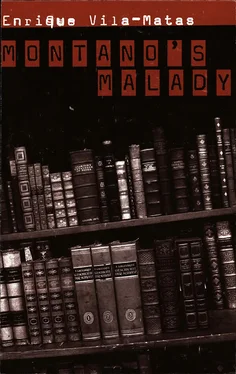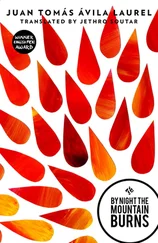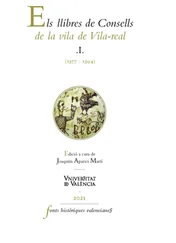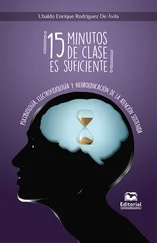* * *
At the end of the twentieth century, I went to Valparaiso to think about explosions. It isn’t that I went with this express purpose, but the truth is that fate arranged everything in such a way that, on the terrace of the Brighton Hotel, watching the explosions that signalled the end of the year and century, I ended up with the impression that I had traveled to this place to think about explosions.
The hanging terrace of the Brighton Hotel afforded a perfect view over the bay. The spectacle at midnight was unforgettable, it will remain as one of the most important memories in my life: from ships anchored in the bay, fireworks were launched to the prolonged hoot of sirens.
During the dictatorship Valparaiso’s fireworks had been a kind of secret popular response to Pinochet’s gunpowder, which meant some on the eve of a new century were carried away by the inertia of so many years of silence and crime and, from the Brighton’s terrace, took up the famous resistance song: “He’s going down, going down …”
Tonight I could write the saddest verses, I thought as I traced the explosions’ drawings in the air. Margot and Tongoy, seeing that I was not well, tried to cheer me up, but I was very metaphysical, in my mind wandering through spaces of explosions and lonely cemeteries and graves full of bones without sound. And when all the electricy of Valparaiso came to an end, it seemed to me that the night turned into a vast hospital and, like Rilke one day, I asked myself, “So is this where people come to live? I would have said they die here.”
I looked out to sea and saw only a black tear of smoke, and slowly, as if overcome by Montano’s malady, I succumbed to absolute melancholy.
I do not search for oddballs, I find them. And these oddballs — it is not easy to elude one’s destiny — always have something to do with literature. In the afternoon of the first day of this century, I abandoned the Brighton’s Victorian terrace, I left Margot and Tongoy getting drunk, and went for a walk on my own in the streets of Valparaiso. Although I struggled against any melancholic thought, it was impossible for me, in the air of the city, in each particle of its air, not to breathe the existence of fatality, terror, mortality.
At one point during the walk, in an attempt to escape from so much death in the air, my eyes came to rest on the tender image of a young woman who was seated on a bench, rocking a child’s carriage. I had the unhappy idea of approaching her. As I went to sit beside her on the bench, I saw that the child had a very visible rash on its forehead. I immediately moved away. The child slept with its mouth open, it was alive, and I thought that this was the important thing. It was best to be content with little, I told myself. The fact that it was living was already a lot. It was best not to ask a great deal more of life.
I ended up at a lively looking bar next to one of the city’s countless funiculars. Very young people stood laughing in the doorway and I thought that, if I went in, it might help me to get over my depression and to forget the horrible rash on the forehead of the sleeping child. I leaned against the long, busy counter and ordered a whiskey. Next to me, a man of about eighty, elegantly dressed, looked me over and, seeing me look at him, asked where I came from. “Barcelona,” I replied. I asked him where he was from. There was a short silence. “I was French. I am the late Charles Baudelaire,” he answered.
A couple of minutes ago I decided to take an Alka-Seltzer to counteract both the excesses of lunch with Tongoy and the unsettling effects of two dry martinis drunk on the sly prior to Rosa’s return. It may not seem important for the diary that I took an Alka-Seltzer, but it is, since it is directly related to Montano. In the same way, whenever I crack open an egg I recall María’s suicide — no doubt because she used to make fun of me when she saw how incompetent I was at breaking the shell — so since my trip to Nantes I have begun to associate Alka-Seltzers with Montano, who is hooked on this medicine being dried up. Such an association is not without malice on my part, since it is a means of fairly constant revenge — I am always taking Alka-Seltzers — revenge for the Hamletlike treatment my son meted out to me in Nantes.
But since the day before yesterday — and this is the interesting part — the association between pills and Montano has ceased to amuse me, because two days ago my son sent me a short story (compressed like a pill) that he recently wrote and with which he has resolved his tragic inability to write. Since the day before yesterday, whenever I go to the kitchen to take an Alka-Seltzer, instead of exacting revenge by silently laughing at his literary paralysis, I remember that he has written this story, which is not exactly a bad or sluggish story, but an amazing one containing the whole of literature’s memory, brilliantly compressed into barely seven pages. I remember that he has written this story — which I like so much I’m even planning to be this story — and it’s not that I can no longer silently exact revenge on my son, but that I’m overcome with admiration and with pleasure (I should say displeasure), such is the way of things.
Edmond Jabès said that, whenever one writes, one runs the risk of never writing again. Paraphrasing Jabès, I have to say that during my stay in Chile, whenever I spoke to Rosa on the phone, I had the impression I was running the risk of never speaking to her again. From the first phone conversation to the last, I was completely baffled. Rosa’s attitude could not have been more odd, everything she said seemed designed to keep me in Chile for as long as possible, sometimes she even seemed to want me never to come back. My first phone conversation with Rosa took place in the evening of the first day of the century, two hours after my strange encounter with the late Charles Baudelaire. I called her on the cell phone that Margot lent me, I called her from the Brighton’s terrace and the first thing that struck me about her was her question: “How is your stress coming along?” She did not normally use such language. The word “stress” in itself was ugly, nor did I think it could be applied to me, who bears scant resemblance to a stressed executive. I protested, without knowing what I was letting myself in for. I said that I had never suffered from stress and asked her what she meant by this. “Heavens above! What is wrong with you then? Montano’s malady, literature sickness? I can see you’re still thinking about everything in literature. You’ve given yourself away, you’re as bad as ever.” Clearly her words were unfair, no doubt she was speaking with premeditated aggression; what was unclear was why she was behaving in this way. With some well-chosen, serene words in an effort to be conciliatory, I told her that I was well again, that Margot and a friend of hers who was identical to Nosferatu had talked to me about dogfights in the air and railway accidents and that I no longer thought in literature at all, at least not in the exaggerated fashion in which I had been doing so in Barcelona. “You’re surely not telling me that you’re planning to return?” she then asked me. I was both surprised and understandably hurt. “I don’t follow you. Of course I want to come back soon. I’m already much better. And, besides, I never said I was going to stay in Chile for the rest of my life,” I answered. “Come back soon? Have you gone mad? Listen, I want you back in Barcelona when you’re fully cured, without a trace of stress,” she said. Her words sounded almost provocative, and my surprise grew by the minute. I am not overly jealous, but I would have to be an absolute fool not to suspect that Rosa might have sent me to Chile to make it easier for her to see someone. “You’re acting very strange,” I told her. These words were my downfall. “What did you just say?” she asked. I told her again that she was acting very strange, and then she hung up on me and I was left staring in bewilderment at the bay and the horizon. I handed Margot the phone. Both she and Tongoy had been listening to the conversation and were as surprised as I was at its outcome. “Didn’t she even want to speak to me?” asked Margot. “To Nosferatu, I’m sure she didn’t,” joked Tongoy. I decided to borrow the phone again and to call Rosa back, I couldn’t leave it like this. “What do you want now?” were her first, unpleasant words to me. I know I shouldn’t have, but I hazarded the following reply: “To know why you don’t want me to come back.” She hung up for a second time.
Читать дальше












